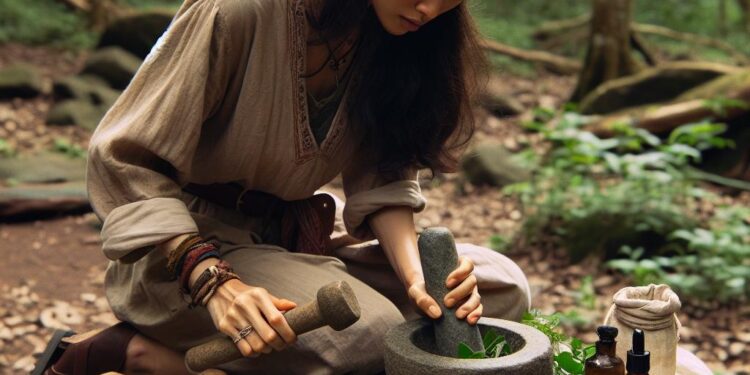In survival scenarios, having a solid grasp of ‘Herbal Medicine Basics for Self-Reliance’ can be a game-changer. Imagine being far from modern amenities and needing medical help—nature’s remedies could be your best bet. Understanding the basics of herbal medicine equips you with the skills to identify and use plants to treat common ailments when conventional options aren’t available. Many folks overlook these skills, thinking they’re too complex, but we’re here to simplify things. This blog will dive into practical advice, realistic solutions, and common pitfalls, empowering you to make nature your ally in emergencies and off-grid living. Let’s get prepared, shall we?
What Are Herbal Medicine Basics for Self-Reliance?
In the world of survival, ‘Herbal Medicine Basics for Self-Reliance’ is your trusty mate guiding you through life when you’re off the beaten path, far from the comforts of urban living. Whether you’re camping in the Yorkshire Dales or hunkered down in an old stone cottage, understanding how to tap into nature’s pharmacy is invaluable. Imagine you’re facing a pesky cold with no pharmacy in sight; a simple concoction of elderberry and ginger could be just the relief you need. Herbal medicine isn’t just about throwing leaves into boiling water—it’s about harnessing the healing properties of plants that have served as our natural allies for centuries. Picture using lavender for a soothing balm after a long day trekking through the forest. This know-how prepares you not just for unexpected ailments but also lends a sense of self-reliance and confidence in your ability to thrive, no matter where you plant your boots.Harnessing Herbal Medicine for Survival
Understanding ‘Herbal Medicine Basics for Self-Reliance’ can significantly enhance overall preparedness and adaptability in survival situations. Here’s why:1. Enhanced Survival Readiness: Having knowledge of herbal medicine ensures you’re equipped with natural remedies for common ailments, boosting your readiness in any situation.
2. Improved Safety: Recognising medicinal plants in the wild can provide safer alternatives when pharmaceutical options aren’t available. This knowledge could be crucial if you’re far from conventional help.
3. Efficient Gear Use: Carrying dried herbs or seeds can be more space-efficient than traditional medical supplies, allowing you to pack other essential gear.
4. Health in Emergencies: When emergencies strike, knowing how to prepare herbal remedies can help manage symptoms and prevent ailments from worsening. It’s like having a mobile pharmacy!
5. Reduced Modern Reliance: Understanding herbal medicine helps reduce dependency on modern healthcare systems, fostering a self-sufficient approach to wellness.
6. Sustainable Living: Using plants responsibly promotes a sustainable lifestyle, keeping within ecological boundaries and ensuring long-term resource availability.
7. Culturally Enriching: Learning about herbal medicine connects you with ancient practices and traditions, enriching your understanding of nature and its bounty.
Leveraging these benefits can make a big difference in how effectively you navigate the outdoor world, transforming challenges into manageable tasks.
Daily Herbal Medicine Use: Self-Reliance Tips
- Start a small herb garden at home. Whether you’re in a city apartment or a rural cottage, use pots to grow basics like mint, chamomile, or lavender for your herbal remedies.
- Learn to identify local plants. Take nature walks with a guidebook or app to recognize medicinal herbs in nearby parks or countryside.
- Attend a herbal workshop. Many communities offer classes where you can learn to make teas, salves, and tinctures with household herbs.
- Incorporate herbal teas into your daily routine. Swap your usual cuppa for chamomile or peppermint to reap health benefits.
- Practice safety first. Ensure you’re correctly identifying herbs to avoid any poisonous look-alikes—safety matters whether you’re in an urban or rural area.
- Add herbal remedies to your survival kit. Stock up on dry herbs or ready-made tinctures for easy access during outdoor adventures.
DIY and Guided Tips for Herbal Medicine Self-Reliance
- For headaches, try peppermint tea or lavender oil. Perfect for campers needing a quick remedy.
- Soothe cuts with calendula ointment. Great for solo travellers exploring rough terrains.
- Eucalyptus leaves can help clear nasal congestion. Ideal for remote workers needing a breath of fresh air.
- Boost immunity with elderberry syrup. Helpful for those spending extended time outdoors.
- If symptoms worsen or you’re in doubt, seek expert guidance or enrol in survival courses.
- When using unfamiliar herbs, consult a professional, especially when heavy-duty gear just isn’t enough.
Affordable Herbal Medicine for Self-Reliance
When preparing for ‘Herbal Medicine Basics for Self-Reliance,’ consider the initial cost and time commitment to adopt these practices.| Aspect | Cost/Time Effort | Description |
|---|---|---|
| Gear Cost | £10 – £50 | Investment in basic tools like a mortar and pestle, drying racks, and storage jars. |
| Training | 1-3 Months | Time spent learning plant identification, preparation methods, and safety precautions through online resources or workshops. |
| Setup | 1-2 Weeks | Organising a small workspace for drying and preparing herbs; gathering initial materials. |
| Ongoing Practice | Weekly | Regularly practising identification and preparation to maintain and expand skills. |
| Book/Resource Materials | £5 – £30 | Costs associated with purchasing guidebooks or access to online courses. |
| Overall Time Commitment | Ongoing | Developing self-reliance and proficiency over time with regular practice and updates. |




